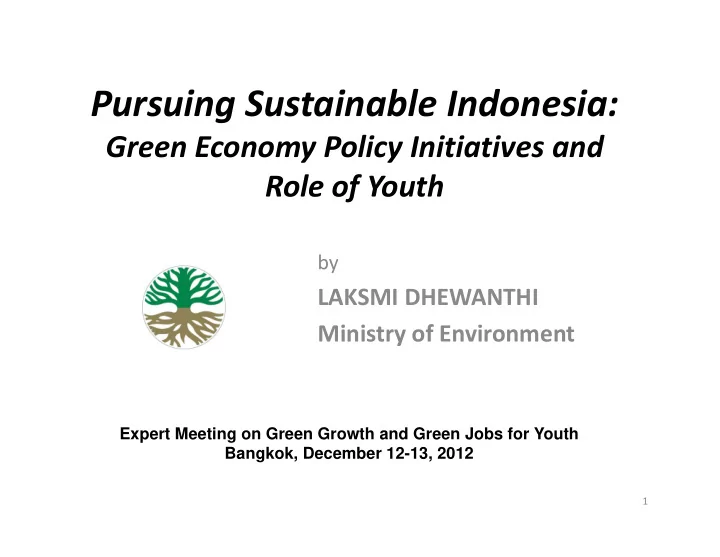

Pursuing Sustainable Indonesia: Green Economy Policy Initiatives and Role of Youth by LAKSMI DHEWANTHI Ministry of Environment Expert Meeting on Green Growth and Green Jobs for Youth Bangkok, December 12-13, 2012 1
LONG TERM DEVELOPMENT MISSION, 2005 ‐ 2025 • Pro ‐ poor (poverty alleviation) 2004 Just and Competitive Distributed • Pro ‐ jobs Indonesia Development • Pro ‐ growth Indonesia as a • Added by Pro ‐ environment Strong, Self ‐ 2007 Green and reliant Everlasting Archipelagic Indonesia Country base on National Interests Vision 2014 “ Prosperous, Dem ocratic and • Economic Growth 7% Just Indonesia” Mission Continue Developm ent to • GHG Emission reduction achieve Prosperous Indonesia 2020 26% (+15%) Strengthen Dem ocratic Pillars Strengthen Justice in every • Reduced biodiversity loss Aspect of Developm ent No specific target related to Youth, yet stakeholder involvement is one of crucial elements, and there is a priority to empowered youth in the context of creativity and technology innovation 2 Source: Bappenas, 2010 and Ministry of Finance, 2012
How Green Economy Fit With Indonesia’ Environmental Policy National Development pro-poor, pro-growth, pro-jobs and pro- environment Long Term National Development Environmental Protection Plan and Management (Law 17/2007) (Law 32/2009) • Emphasizes on RE & internalizing the externalities Medium Term NDP • Promotes various instruments: (National Priorities) • EIA/SEA • Environmental Standards • Economic Other instruments, government/local Programs at Other • Green budget; government Ministries/ Agencies • etc related • Stronger regulations Laws commitment and 3 enforcement Source: modified from Fauzi, A, 2010
Challenges POLICIES as well as MARKET FAILURES (subsidized growth, distorted energy prices, no internalized of externalities) • Reshape Fiscal and Financial Infrastructure • Food Security • Energy Security • Moving from Single Track to Multiple Track INTERVENTIONS FOR MARKET CORRECTIONS AND CHANGING BEHAVIORS
GREEN ECONOMY ‐ 3 component Sustainable use of natural resources, internalizing cost of natural resource depletion/environmental degradation , efforts on alleviate the poverty, creating decent jobs, and ensuring sustainable economic growth” Expected behaviours for GREEN ECONOMY LOW CARBON AND SUSTAINABLE USE OF MAINTAIN NATURAL LESS HARZARDOUS BIOLOGICAL DIVERSITY CARRYING CAPACITY WASTE I. ROAD MAP OF LOW II. Update IBSAP III. SPATIAL PLANNING CARBON (National/Regional (Indonesia emphasizing on Environmental Action Plan on GHG emission Biodiversity Strategic Carrying Capacity Reduction (RAN GRK)) Action Plan) REDD+ YOUTH in crucially important for the greener Indonesia Source: MoE, 2012 and Bappenas, 2012
CHANGING BEHAVIOUR TOWARD GREEN ECONOMY 1. Renewable energy, 2. Low carbon transport, 1. Agriculture 3. Energy efficient 2. Building buildings, 3. Urban/Cities 4. Clean technology, 4. Energy 5. Improved waste 5. Fisheries management, 6. Forestry 6. Improved freshwater 7. Manufacture provision, 8. Tourism 7. Sustainable agriculture 9. Transportation and forest management, 10. Waste 8. Sustainable fisheries. 11. Water TRANSITIONAL PROCESS Green jobs Source: Bappenas, 2012 6
For Greater Involvement of Youth Youth has been one of important stakeholders of sustainable development in Indonesia. Efforts has been taken yet further development and enhancement needed. EXISTING • Access to Information – ACIL (Aku Cinta Lingkungan Hidup), a dedicated website for Children and Youth on environment – Children and Youth Environmental Week (annually) • Education for Youth and Children – “Adiwiyata” an Green School Initiative and Award, aimed to earlier educate green ‐ lifestyle to youth – Green Camp for Youth, including 3 ‐ R related of training • Youth in International Fora – Youth Climate Forum – G20 Youth Program 7
• Young Socio ‐ entrepreneurship – Eco Youth Program, jointly with private sector, a green innovation competition – Climate Smart Leader, jointly with NGOs, a green innovation competition • Financing Scheme for young entrepreneur – Started 2011, “ Gerakan Kewirausahaan Nasional ” (National Entrepreneurship Movement), targeted on young entrepreneur to enhance economic growth. i.a. business incubator and technology innovation jointly with universities ; – Credit program for “Koperasi Pemuda” (Youth Cooperative); – Internship Program for Youth, a public private partnership, in order to “link and match” between formal education and business sector – A “Syaripreneur”, a joint program with Islamic Universities for potential young entrepreneurship in syaria business. 8
For Greater Involvement of Youth cont’d FUTURE The Voice of Children and Youth for Rio+20, an outcome of 2011 Tunza International Children and Youth Conference (Bandung Declaration). Post Rio+20, THE FUTURE WE WANT Para 62, encourages each country to consider the implementation of green economy policies in the context of sustainable development and poverty eradication, in a manner that endeavours to drive sustained, inclusive and equitable economic growth and job creation, particularly for women, youth and the poor. Continue current efforts, with emphasizing on: • Capacity Building: Education, Information • Innovative Financial Schemes: Socio- entrepreneurship 9
Vision beyond Rio+20 • Common vision, missions and objectives cointained in “The Future We Want” can only be achieved with a broad alliance of people, governments, civil society and private sector, all working together; • Development Agenda beyond Rio+20 need to include various sets of value of the three pillars of sustainable development (social ‐ economic ‐ environment); • Green Economy as one of important tools need to complement with many others important tools as to ensure sustainable patterns of consumption and production. • Although Indonesia is still facing challenges in ensuring poverty eradication as well as in managing the environment, Indonesia continue commit and strengthen its efforts towards “sustainable growth with equity”. 10
Closing Remarks • Sustainable Development can only be achieved with a broad alliance of people, governments, civil society and private sector, all working together to secure the future we want for present and future generations. • Indonesia is still facing challenges in ensuring sustainable use of natural resources as well as in managing the environment. Hence, the Government of Indonesia together with all stakeholders shall continously and consistently develop and implement sound policy and programme towards sustainable development. 11
Thank you Thank you For further information: Assistant Deputy Minister for Environmental Economic Deputy Minister for Environmental Governance, Ministry of Environment http://www.menlh.go.id/pinjaman lunak, Tlp/Fax. 021 8517161 12
Recommend
More recommend